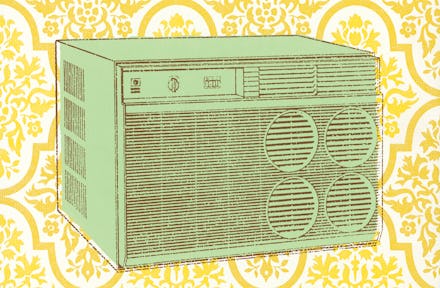Here's how air conditioning spreads coronavirus

As we move into the dog days of the COVID-19 pandemic, otherwise known as summer 2020, a lot of people are beginning to wonder how to stay healthy. Because the novel coronavirus is novel, scientists are only beginning to discover the details about how it spreads. We all know by now that COVID-19 is transmitted through respiratory droplets, but it’s confusing to try to parse out what that means about how to curb spread indoors, where air conditioning is an integral part of our summer experience. Most Americans live and work indoors, so we all want to know if air conditioners will spread coronavirus.
This is how experts believe transmission works: Respiratory droplets created by an infected person coughing or sneezing move through the air. When those droplets are inhaled by another person in a large enough amount (called a viral load) or come into contact with that person’s mucus membranes — eyes, nose, or mouth — they could become infected. The problem with air conditioning is that it causes droplets to move more quickly and travel farther within an enclosed space, which theoretically can increase the spread of COVID-19.
The problem with air conditioning is that it causes droplets to move more quickly and travel farther within an enclosed space, which theoretically can increase the spread of COVID-19.
“If you are in a small space that is not well ventilated, then air currents could potentially spread the virus throughout the room,” says Sandra Kesh, a New York-based doctor who specializes in infectious disease. But, she adds, “I don’t think that AC itself increases the risk of being infected.” Kesh explains that if air conditioning played a major factor in spreading COVID-19, we would probably see much higher rates of infection, but adds that scientists are still trying to figure out how problematic A/C might be.
Kesh mentions that some of people’s fear about air conditioning comes from early cases of COVID-19 spreading in restaurants, but notes that the case in China in which 10 people were infected doesn't appear to have been replicated so far. Still, it is true that indoor spaces are riskier than outdoor, and air conditioning may play a role. Both wall units and central air conditioning in homes recirculate air within a given space, which could spread the virus if the virus is present.
But if you work or live in a place where you have some control over the environment, there are easy things you can do to reduce the potential for transmission. You can turn off the A/C off and open windows in a space where someone may be infected. But will we all go A/C free in a heatwave? Probably not. Kesh is realistic about the fact that most of us are going to use air conditioning in the summer, and she says that the key is to make it as safe as possible.
“Change filters regularly, make sure exhaust fans are in the washroom and use high efficiency particulate air (HEPA) filters,” Kesh says. “If you can, keep the doors open so there is good air flow.” That way, she adds “you won’t have 10 people in a room with everyone sharing the same air.”
But what if you live or work in a large building where you can’t control who you’re sharing air with? First of all, Kesh says that you should follow the generally prescribed precautions of wearing a mask, handwashing, and social distancing.
Should you be worried that you will get sick if someone in your building has COVID-19? It shouldn't be your primary concern. “If someone had the virus in one office, it’s not likely it could be spread to another office in the same building through an A/C vent,” Kesh says. “We are not currently seeing that happening.”
But Kesh also wants us all to remember that scientists are still figuring out all the less expected ways that coronavirus could spread. “The jury is still out on how much airborne transmission plays a role in the spread of COVID-19,” she says. “There is a good assumption that this does play a role, but the extent to which it does is anybody’s guess.”
That may not feel that reassuring, but Kesh says that we just can’t get to zero risk. What we can do is continue to follow best practices that lower our risk and try not to get freaked out by every possible infection scenario. “The majority of viral spread is happening through respiratory droplets and close prolonged contact with an infected person,” she says. “Continuing to remember that will help take some of the concern out of AC being a factor in the spread of the virus.”